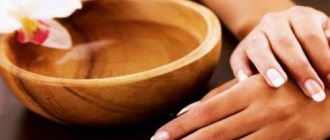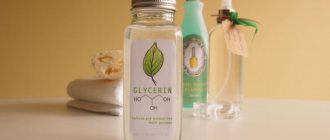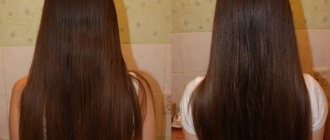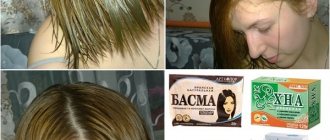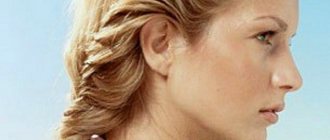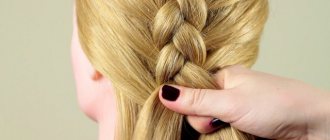How to properly wash hair that is prone to oiliness?
Using just a cleansing shampoo for your hair is not enough; you also need to know how to wash your hair properly. According to experts, you should wash your hair as your hair gets dirty.
Yes, indeed, such a statement is correct, but certain rules must be followed:
- An effective shampoo for oily hair will have even more results if you wash it off with boiled, filtered or distilled water. If this is not possible, then at least rinse your strands with it.
- The rinse water should be acidified by adding a tablespoon of vinegar per liter of liquid. Or two tablespoons of chamomile flower tincture per 500 ml of water with a small addition of citric acid.
- An excellent result when treating oily hair can be achieved by simply rinsing with cold water; this blocks the secretion of oil by reducing the size of the pores.
- If your hair is very oily and its ends are dry as a result of constant washing, try to apply shampoo only to the beginning of the hair, without rubbing it into your head.
When using a cleansing shampoo for oily hair, the water for rinsing it off should be warm, and if health allows, then completely cool. When using hot water, you will only further stimulate the sebaceous glands, increasing the oiliness of your hair.
Types of hair growth products
For hair loss:
- Pour a liter of boiling water over 3 tbsp. oak bark. Boil over low heat for 8-10 minutes. Moisten the strands with the decoction. You can wash it off after a quarter of an hour. Use no more than twice a week. By the way, this mixture will help speed up hair growth.
- Boil 800 ml of water with burdock root or chopped Vietnamese tree. Let it sit for an hour and you can wash your hair.
- Beat 2 yolks until stiff foam forms. Add tsp. cognac You can also use vodka. Dilute the mixture a little with water. Add lemon juice or vinegar. A few drops are enough. Rinse your hair with this mixture after washing.
The secret to choosing the best shampoo for oily hair

When choosing which shampoo to wash oily hair, you must take into account that it should not only reduce the functioning of the sebaceous glands, but also block their subsequent appearance. Therefore, it is recommended to choose a medicated shampoo for oily hair that contains natural herbal extracts, antibacterial components, vitamins C, K, A, and also in the case of dandruff with the addition of zinc, sulfur and tar.
The best shampoo for oily hair should include extracts of sage, burdock root, coltsfoot, horsetail and nettle. When choosing a suitable detergent, you must adhere to the following rules:
- if after several washing procedures, your hair begins to comb well, shines and does not become greasy for a long time, then this shampoo for oily scalp is suitable for you;
- do not forget to carefully study the composition of the detergent indicated on the bottle;
- in order to choose an effective shampoo for oily hair, use a sampler, this will help you not waste money and not take up a lot of space in the bathroom;
- Shampoo should be changed no more than once every two months, since with its constant use the skin gets used to it, as a result of which the effect may be lost.
Try making homemade shampoo for oily hair, because there is nothing better than such a product. One of the simplest recipes is this: beat three egg yolks thoroughly with a whisk, then add 20 grams of cognac and mix - that’s it, the hair wash is ready.
Pay attention to cosmetics that do not contain aggressive substances; natural shampoo for oily hair should contain only natural elements that have anti-inflammatory, bactericidal and tonic effects.
Making soap-based shampoo
To make shampoo, you will need a soap base. You can buy it in almost every pharmacy. It contains about 70% gentle substances that provide gentle cleansing. It is also rich in natural ingredients such as aloe vera.

As for the shade, it can be colorless or light yellow. Preparing shampoo at home involves enriching the base with essential oils and fragrances. Moreover, this miracle product is suitable for any hair type.
The cooking process includes the following steps:
- In a water bath, bring the base to body temperature;
- Then add your favorite essential oils and growth enhancers to the liquid. But keep in mind that everything should be in moderation; you should not give too much of it. Two drops are enough;
- While stirring the liquid, add about ten small spoons of herbal infusions;
- Remove the container from the heat and let it cool, then pour it into a clean container with a lid, where you plan to store it;
- Use your “culinary masterpiece” like regular shampoo to which you are already accustomed.

Remember that when preparing shampoo for hair growth at home, it is very important to choose the right oils. So, for example, burdock oil is ideal for weakened strands, but avocado or jojoba is ideal for oily strands.
Recipes for homemade shampoos against oily hair

Homemade shampoo for oily hair, the recipes for which are given below, is no worse than the store-bought version, and to some extent even better. After all, only natural ingredients are added to its composition, which refresh oily hair and strengthen the action at the root, giving a feeling of cleanliness throughout the day.
A shampoo recipe for oily hair can include a variety of ingredients. All that remains is to choose the most suitable and simple option for your specific case.
Mustard shampoo
Mustard-based shampoo for very oily hair is the fastest and easiest to prepare at home. It can not only cope with pollution, but also strengthen the roots, enhance hair growth and give it volume. To prepare it, stir a tablespoon of mustard powder in two liters of boiled, cooled water. Wash your hair with this composition for 5-7 minutes, then rinse well with water.
Oak shampoo
Since ancient times, a decoction of oak bark has been used for oily scalp. This substance allows you to make your hair smooth and well-groomed, and you can use it both as a rinse and as a shampoo.
To prepare homemade shampoo for oily hair based on oak bark, take four tablespoons of oak bark per liter of water. Bring the mixture to a boil over high heat, then reduce the heat and simmer for 5 minutes. After cooling, the product is ready for use.
Rye shampoo
Natural shampoo for oily hair based on rye bread strengthens damaged follicles, removes impurities and restores damaged areas. Soak a piece of rye bread in ¼ glass of water, adding a tablespoon of mustard powder to it. Wash your hair with this product, rubbing it into the scalp. You can leave it on your hair for a while so that more nutrients are absorbed.
Corn and egg shampoos
To create corn shampoo, you will need to mix one teaspoon of sea salt with one spoon of table corn. Apply the dry composition to the roots, then rinse with heated water.
Therapeutic egg-based shampoo for oily hair adds shine, making your hair silky and healthy. To prepare it, you will need to mix a tablespoon of cognac, four tablespoons of hop cones and three yolks. This product can be used not only as a detergent, but also as a nourishing mask.
Lemon and clay shampoos
To mix lemon shampoo you will need an egg yolk, a teaspoon of almond oil and a tablespoon of vodka. This product allows you not only to cope with oily hair, but also to give softness, shine and smoothness.
Clay shampoo works great on very oily hair. To create it, you will need to mix a tablespoon of horsetail decoction and two tablespoons of clay. Daily clay masks will also be helpful.
With glycerin to get rid of dandruff
If dandruff occurs excessively, shampoo with glycerin will help, which will eliminate dryness, moisturize, and saturate the hair with oxygen. The oils in the shampoo will soothe the scalp. To prepare an anti-dandruff remedy you will need:
- ½ cup coconut milk;
- 1 glass of liquid soap;
- ½ cup glycerin;
- 4 teaspoons coconut oil;
- 10 drops essential.
Homemade shampoo recipe for dry hair:
- Mix coconut oil and glycerin in one bowl, soap and milk in another.
- Pour the contents of the second cup into the oil mixture in a thin stream. Mix thoroughly.
- Add essential oil.
- Shake the bottle before use.
- Distribute shampoo through hair with a fine-tooth comb.
- For greater effectiveness, leave the product for 30 minutes, wrapping your head in a plastic bag. Store shampoo in the refrigerator.
Remember the contraindications to glycerin:
- with increased oily hair it is not recommended to use glycerin;
- with prolonged use, allergic reactions are possible;
- do not apply to skin lesions;
- use products with glycerin in a humid environment (otherwise it will absorb moisture).

- How is HIV transmitted?
- Coaching - what is it? Methods and technologies of effective coaching for self-development and achieving goals
- Zucchini in the microwave
What components can be used in shampoo

There are many ingredients available for hair care, here we will look at some of them.
- Base Lavante neuter BIO
is a neutral detergent base. This French completely natural product can be used not only as a base for shampoo, but also for shower gel. It is a transparent liquid with a yellowish tint, does not contain dyes, synthetic fragrances, silicones, parabens and other harmful components. The base alone will be enough to wash your hair well, but it is better to add active ingredients to it to obtain a complete washing product. The shampoo, certified in accordance with Ecocert standards, is suitable for all hair and skin types, even sensitive ones. Base Lavante neuter BIO contains natural ingredients, including mineral water, damask rose hydrolate, linden and verbena, and lactic acid. - Panthenol (Provitamine B5)
is a colorless, viscous liquid widely used in cosmetic products labeled “natural.” Provitamin B5 strengthens hair along the entire length, promotes better combing of strands, better hair growth, soothes irritation and reduces itching of the scalp. The optimal dosage is 2-5%. - Squalane (Squalane v?g?tal d'Olive)
is a fatty, colorless liquid that prevents hair dehydration. The product, which has softening and antioxidant properties, is used to care for dry and colored hair in an amount of 5-15% of the total weight of the finished product. - Lactic acid (Acide lactique)
is a colorless liquid widely used to lower the pH level of cosmetic products to the required value, including shampoo. This substance makes hair softer and shiny, while eliminating dead cells from the scalp. - Natural coconut silicone (Emollient Coco silicone)
is a fatty, colorless or pale yellow liquid with a neutral odor, makes hair silky to the touch, protecting it from environmental influences. Used for curly, dehydrated, colored or damaged hair in an amount of 3-20%. - Emulsifier BTMS (Emulsifiant BTMS)
- white granules with a slight ammonia odor, which are a vegetable emulsifying wax. The component can be used in shampoos, conditioners and masks in a dosage of 2-10% to obtain a stable emulsion for hair care, making it soft and silky. This wax lowers the pH level of the final product. - Stinging nettle powder (Poudre d'Ortie piquante)
- green fine powder, strengthens hair, helps cope with hair loss, regulates sebum. Used in an amount of 10-20% of the total mass of shampoo. - Ceramides (Actif cosm?tique C?ramides v?g?tales)
is a valuable brown viscous liquid extracted from sunflower oil that improves hair strength. This substance helps protect curls from damage as a result of dyeing or straightening with an iron, prevents dandruff, and makes strands more shiny. The optimal dosage is 1-5%. - Honeyquat active
is a component obtained from honey, used in 2-in-1 shampoos, conditioners and masks. Improves the shine and texture of strands, makes hair more resilient and soft, and makes combing easier. It has a good effect on dry and dehydrated hair, curly hair and damaged hair from perming or dyeing. Occupies 2-5% in the finished product. - Maca vital (Actif cosm?tique Maca vital)
is a viscous liquid that stimulates the growth of strands, preventing hair loss by improving the resistance of the bulbs to external factors. Used in an amount of 1-5%. - Keratin'protect active
is a light brown to brown viscous liquid extracted from brown seaweed extract. It is noted for its ability to make curls more shiny and resistant to high temperatures. In addition, the component boasts moisturizing properties. Add to other shampoo ingredients in an amount of 1 to 5%. - Hydrolyzed rice protein (Prot?ines de Riz hydrolys?es)
is an active used in shampoos aimed at adding volume to hair and preventing moisture loss. Also, this substance with an optimal dosage of 0.5-5% makes styling easier. - Babassu foam (Tensioactif Mousse de Babassu)
is a component that is a very soft surfactant that has foaming functions. Babassu foam in an amount of 2 to 10% has a gentle effect on the strands and promotes easy combing.
Essential oils play two roles simultaneously.
Firstly, they give the product a special aroma, and secondly, they really, in combination with other components, can solve some problems (oily hair, hair loss, dandruff, etc.). For dry hair you can use essential oils of tangerine, frankincense, sandalwood, jasmine and others; for oily hair - sage, rosemary, grapefruit, pine; for hair loss, use rosemary or petitgrain oils. If you have other oils in stock, do not rush to order the above esters; it is quite possible that your options will be perfect for adding them to shampoo and will improve the condition of your curls.
Recommendations before use

- First, you must decide on your hair type. According to him, choose the necessary organic product that is right for you.
- Try to experiment with different recipes all the time until you find the one that your hair likes the most.
- Natural shampoos may not lather at all, but that doesn't mean they don't work.
- Don't overcook the product. Since homemade shampoos do not contain preservatives. This means that it will not be stored for a long time.
- Start using shampoo once a week. If the result suits you, switch to two times a day. It is better to avoid using industrial shampoo at this stage because you have to give your hair time to get used to the natural one.
- Be prepared for the so-called “transition period”. Judging by numerous reviews on the Internet, at first you may think that your strands are too greasy and dirty. This happens because your scalp is accustomed to aggressive detergents, so it still continues to produce quite a lot of lubricant. Until she gets used to mild detergents, the effect of oily curls will persist. It may take a full month to adapt to natural washing.




